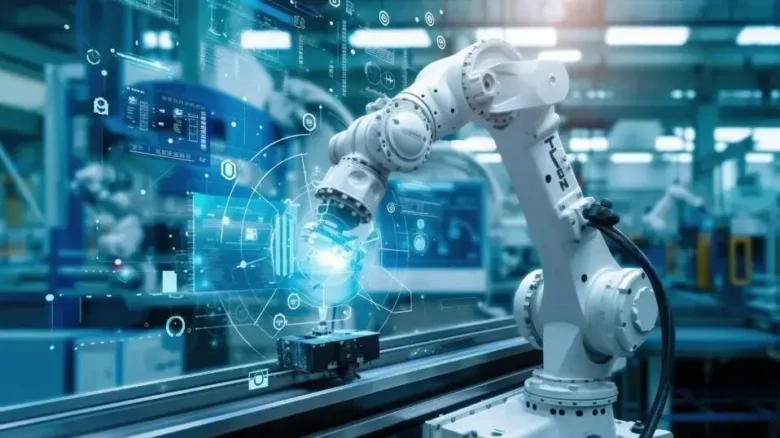The technology industry has been a major factor in this evolution. Each year, new technologies propel industries toward new possibilities, changing how businesses function and communicate. They also help provide value. These advances not only alter alteindustries , but also open up the possibility for new industries to develop. In the present, numerous technological developments have been able to trigger change, each one more powerful than the one onbefore. . From helping make better decisions to enabling seamless communication, these developments are transformative. In this article, we will explore the technological trends that are shaping the current world.
Artificial Intelligence and Machine Learning
Artificial Intelligence (AI) and Machine Learning (ML) are not just science fiction. They are crucial to how industries evolve and innovate. Companies of all sizes and scales are using AI to boost efficiency, improve processes, and take data-driven decisions. Healthcare uses AI to detect disease in its early stages, while retailers use personalization to provide a customized customer experience. The possibilities are limitless. Machine learning, a part of AI, plays a crucial function in predictive analytics. It allows businesses to spot trends before they occur, identify irregularities, and provide precise forecasting. These techniques have revolutionized fields such as autonomous vehicles and fraud detection, as well as creative activities like content creation and digital arts.
Internet of Things (IoT)
The Internet of Things connects everyday gadgets and objects to each other and creates a seamless web of connected technology. This network is making giant advancements in agriculture, manufacturing, healthcare, and smart cities. IoT has opened the way to automate maintenance in factories by monitoring the critical machinery with sensors, reducing downtime by a significant amount. In health, IoT-powered devices monitor patient data in real time, allowing rapid responses to health problems. Agriculture, too, has been transformed by IoT-enabled intelligent farming, in which sensors track the soil’s moisture and temperature as well as other aspects to improve the yield of crops. Through creating a bridge between the digital and physical worlds, IoT revolutionizes the way that industries think about operations and customer interaction.
Blockchain Technology
Ofttimes, cryptocurrency is associated with it, but the impact of blockchain technology extends beyond the realm of digital currency. In its essence, the blockchain is all about security and transparency, which is something every business requires. Banking and finance gain from blockchain due to more secure, faster, cost-effective cross-border transactions. In the same way, supply chain management utilizes blockchain for traceability as it ensures authenticity while reducing fraud in sectors such as fashion, food, and pharmaceuticals. Smart contracts, a different blockchain technology, can simplify legal agreements by performing predetermined conditions in a timely manner. The government is also looking into blockchain technology to create transparent voting systems as well as efficient recording. Its capability to establish trust without centralization makes blockchain an essential tool in fields that heavily depend on the integrity of transactions and security.
Cloud Computing
Cloud computing is now the core of scalable and efficient business processes. Through replacing costly on-premise systems, cloud computing allows companies to store and retrieve data easily from anywhere. Small and emerging businesses can benefit tremendously from having access to the latest computing capabilities without the large cost normally required for conventional infrastructures. Cloud platforms go beyond storage. They allow collaboration across different geographical areas and make remote teams more efficient. In addition, the latest developments with the hybrid cloud model give enterprises the option of combining public and private cloud environments, which can reduce costs while ensuring security. From hosting virtual events to enabling advanced analytics on data cloud computing, it is an invisible catalyst for a variety of technological advancements.
5G Technology
5G technology is helping lay the foundations in the direction of future connectivity and communications. It promises speeds that are up to 100 times more efficient than the predecessor technology, 4G, alongside reduced latency and better reliability. This advancement in wireless technology allows instant communication between devices, making apps such as autonomous vehicles as well as AR (augmented reality) and VR (virtual reality) experiences more efficient and effective. Telemedicine and other industries rely on the speed of 5G’s technology to allow high-quality video consultations as well as remote operations. Retailers can create highly personalized and immersive shopping experiences with AR. Furthermore, smart cities that are powered by 5G are increasing the quality of urban living by enhancing public safety, traffic management, and sustainability. 5G isn’t only enhancing mobile connectivity but also accelerating the digital revolution.
Innovating the Future through Innovation
The developments discussed above aren’t just affecting industries, but they are changing the possibilities. Each technological breakthrough builds upon the others and creates a chain reaction of advancement. Companies that embrace these advancements are better placed to stay competitive, responsive, and resilient in a rapid-paced environment. But the true problem lies in the strategic use of these technologies. Businesses must concentrate on enhancing their employees and aligning their objectives to get the most benefit from these game-changing developments. The future belongs to those who can keep up with the latest tech advances and create change through imagination and innovation.
FAQs
1. What industries are most benefited by AI as well as ML?
Every industry can benefit from AI and ML, with notable contributions that can be seen in finance, healthcare marketing, logistics, and finance. These systems streamline processes as well as reduce the chance of errors. They also provide actionable information.
2. What is the way IoT changes business processes?
IoT transforms the way businesses operate by enabling improved asset monitoring, pre-planned maintenance, and data collection in real time. This technology helps reduce operational inefficiencies and improve customer service.
3. Does blockchain only apply to cryptocurrency?
There is no doubt that blockchain has uses in applications that go beyond cryptocurrency. It is being utilized in areas like finance, supply chain management, and even the government sector to increase security, transparency, and efficiency.
4. What is the significance of 5G for industries?
5G’s greater speed and lower latency allow real-time communications and also technology support such as AR/VR, augmented reality, and even autonomous devices, which encourage the development of a variety of industries.
5. What are the major advantages of using cloud computing?
Cloud computing provides scalability and cost savings, improved collaboration, and data security, which makes it an ideal choice for modern companies to streamline the efficiency of their operations.




